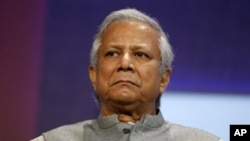Nobel laureate Muhammad Yunus says the Bangladeshi government is trying to gain control of the microfinance bank he founded.
Yunus spoke to a panel on microcredit in Washington via teleconference Monday and said his dismissal as head of Grameen Bank was political. He says the bank should remain in the hands of its poor borrowers.
The Central Bank, which owns a 25 per cent stake in Grameen Bank, sacked 70-year-old Yunus last week, saying he violated retirement laws by staying on past the age of 60. It also said proper procedures were not followed when he was appointed managing director in 1999.
The Nobel Prize winner has been under attack from the government for alleged financial irregularities at Grameen. Yunus' supporters say his dismissal is also related to his decision to make a brief attempt to set up his own political party in 2007.
Yunus on Monday denied any political aspirations and rejected allegations of financial impropriety at the bank.
He said he had planned to attend the conference in Washington, but canceled the trip, noting that things in Bangladesh were "going in the wrong direction."
Yunus is appealing his dismissal, saying the decision was illegal. On Monday, the High Court in Bangladesh wrapped up hearings in the case and said it would rule Tuesday.
In December, Prime Minister Sheikh Hasina accused Yunus of treating the bank as his personal property, and of robbing the poor, charges he strongly denied.
Yunus has the support of opposition leaders in Bangladesh and overseas development experts who say he has helped to lift nearly nine million families out of poverty.
Yunus, a famed economist, pioneered the concept of micro-credit, which involves granting loans as small as $27 to poor people to begin income-generating projects. He established the Grameen Bank three decades ago to provide those loans. As the concept of micro-credit spread to many developing countries, he won international acclaim and the 2006 Nobel Peace Prize for his work.
Some information for this report was provided by AP, AFP and Reuters.




